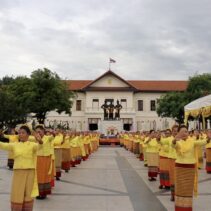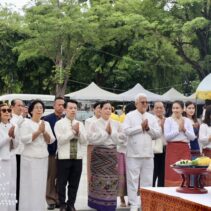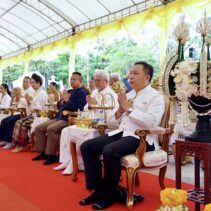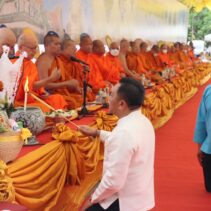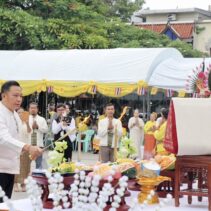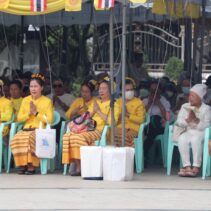Governor of Chiang Mai ‘or at Pongsitthithavorn joined a number of dignitaries and citizens earlier today at Three Kings Monument to lead the annual Sueb Chata Muang (City Spirit Renewal) ceremony for the year 2025. The event was held to bless and extend the city’s spiritual lifespan, bring prosperity and happiness to its people, preserving an ancient tradition passed down through generations.
The Sueb Chata Muang ceremony was conducted at ten sacred sites around the city: the five city gates—Tha Pae Gate, Chiang Mai Gate, Suan Prung Gate, Suan Dok Gate, and Chang Phueak Gate—as well as the four corners of the old city wall—Ku Huang, Hua Lin, Si Phum, and Katam corners. The final location was at the city’s “navel,”, or navel-adjacent at Three Kings Monument at the city center. A signal flare was launched from the city centre to mark the beginning of the ceremony, which was performed simultaneously at all ten locations. Monks participated in the rituals to offer blessings.
Chiang Mai was founded by King Mangrai the Great, with the support of his ministers and people, and in consultation with his close allies—King Ramkhamhaeng of Sukhothai and King Ngam Mueang of Phayao. The city was established over the period 1295–1296 A.D. under the name Nopburi Sri Nakorn Ping Chiang Mai, becoming the royal capital of the ancient Lanna Kingdom. Initially establish to protect the region from the marauding hoards of Kublai Khan, threatening to invade Lanna from China’s Yunnan. Thankfully he died two years before he could make good on his threats in 1294, and Chiang Mai was allowed to prosper without any immediate threat of war.
The city was planned in accordance with both topography and traditional astrological beliefs from the Mahathaksa scriptures, which include seven aspects governing the city’s fate: the city’s companions, lifespan, power, prestige, foundations, industries, and misfortunes.
